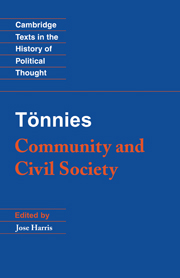Book contents
- Frontmatter
- Contents
- Acknowledgements
- General introduction
- Chronology of Tönnies's life and career
- A note on the texts and further reading
- A note on translation
- Glossary
- COMMUNITY AND CIVIL SOCIETY
- Book One A general classification of key ideas
- Book Two Natural will and rational will
- Book Three The sociological basis of natural law
- Section 1 Definitions and propositions
- Section 2 The natural element in law
- Section 3 Inter-related forms of will – commonwealth and state
- Appendix: Conclusions and future prospects
- Index
- CAMBRIDGE TEXTS IN THE HISTORY OF POLITICAL THOUGHT
Section 2 - The natural element in law
Published online by Cambridge University Press: 05 June 2012
- Frontmatter
- Contents
- Acknowledgements
- General introduction
- Chronology of Tönnies's life and career
- A note on the texts and further reading
- A note on translation
- Glossary
- COMMUNITY AND CIVIL SOCIETY
- Book One A general classification of key ideas
- Book Two Natural will and rational will
- Book Three The sociological basis of natural law
- Section 1 Definitions and propositions
- Section 2 The natural element in law
- Section 3 Inter-related forms of will – commonwealth and state
- Appendix: Conclusions and future prospects
- Index
- CAMBRIDGE TEXTS IN THE HISTORY OF POLITICAL THOUGHT
Summary
The ancient philosophy of law was concerned with the problem of whether law was a product of nature (physei) or of artifice (thesei or nomô). The response of modern theory is that everything originating from the human mind or formed by it is both natural and artificial. But in the course of development the artificial overtakes the natural, and the more specifically human – particularly the mental power of will – gains in scope and importance, until in the end it attains at least relative autonomy from its natural base and may even come into conflict with it.
Thus all community-type law is to be understood as a creation of the reflective human spirit. It is a system of thoughts, rules and maxims, comparable to an ‘organon’ or a productive process, which originated in a mass of inter-related activity and practice, and adapts previously undifferentiated material by means of development from the general to the particular. Hence Gemeinschaft law is an end in itself, although it necessarily relates to that social whole to which it belongs, from which it originates, and of which it is in itself a special manifestation. It takes for granted a certain solidarity among human beings as a natural and necessary mode of existence; indeed, it assumes that a protoplasm of law is a spontaneous and inevitable product of collective life and thought.
- Type
- Chapter
- Information
- Tönnies: Community and Civil Society , pp. 211 - 221Publisher: Cambridge University PressPrint publication year: 2001
- 1
- Cited by



